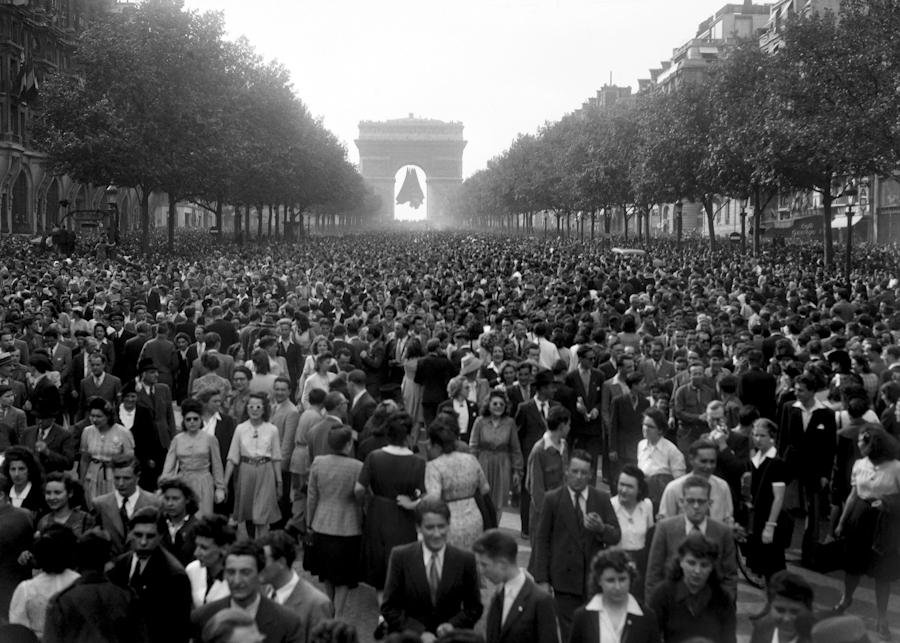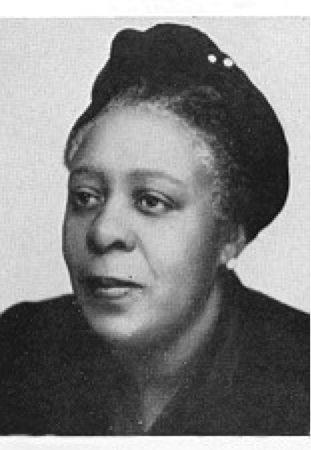From Concentration Camps to the Senate: Black Women in the French Resistance

The role that over a million African soldiers played in World War II has garnered interest in recent years. Calls for countries such as Britain and France to recognize and compensate the troops mobilized from their former colonies to fight for the liberation of metropoles in Europe are timely. They have also focused on the voices and experiences of men from Africa and the Caribbean who served in these armies. As is often the case, black women have been disappeared from this already-marginalized history. Yet these women were also instrumental in the war effort, often combining their fight for liberation abroad with demands for freedom at home. In the French context specifically, the example of two women, Jane Vialle and Eugénie Éboué, suggests that uncovering black women’s roles in the French Resistance provides us with a clearer understanding not only of the history of France during World War II, but also of women’s contributions to subsequent anti-colonial movements in the postwar period.

As early as 1944, recognition of women soldiers in World War II focused on white French and British women. Jane Vialle’s trajectory from a concentration camp to the French Senate is a remarkable but understudied story. Vialle was born in Ouesso in Congo Brazzaville, present-day Republic of the Congo, on August 27, 1906 to Michel Vialle, a French man, and an African woman only recorded in the archives as Tchiloumba. Her father, an ivory and rubber trader in Central Africa at the time, returned to France with a seven-year-old Jane in tow. She received her baccalauréat from the lycée Jules Ferry in Paris and went on to work as a journalist for Opéra-Mundi and as a correspondent for newspapers in French West Africa. She moved from Paris to Marseille at the start of World War II, where she was a clandestine agent for Jean Gemälhing, head of information services for the Provence-Côte d’Azur regional branch of Combat, which was one of the three major Resistance movements in the south of France. In January 1943 she was charged with treason, tried, and convicted. She was incarcerated for four months in the Brens women’s concentration camp and then transferred to the Beaumettes women’s prison in Marseille until December 1943. Some sources, including the French government itself, indicate that Vialle escaped from prison, after which she disappears in the archives for a number of years.

Éugénie Éboué was born Eugénie Tell in Cayenne, French Guyana on November 23, 1891. She married Félix Éboué in 1922 and moved to Oubangui Chari, present-day Central African Republic, where her husband worked in the colonial administration. Éugénie and Félix had two children, a son Charles and a daughter Ginette, who later married Léopold Senghor. Éugénie moved to Chad in 1938 when Félix was appointed governor. At the start of World War II, she joined the Women’s Army Auxiliary Corps and was stationed as a nurse at the Brazzaville military hospital until 1944. Her contributions to the war effort and subsequent political activism earned her at least twenty-six medals of recognition, including three of France’s highest honors: a Médaille de la Résistance (1945), a Croix de Guerre avec Palme (1939–1945), and a Chevalier de la légion d’honneur (1946).

Jane Vialle’s and Éugénie Éboué’s stories converged after World War II, when both women were elected into the French Senate. Vialle was a representative for Oubangui Chari, and Éboué represented Guadeloupe in the Senate. These roles allowed both women to move their work from the sphere of clandestine resistance of fascism to the sphere of open engagement with colonialism. They used their positions in the Senate as a platform to advocate for legislation that would extend state rights and protections to women in France’s colonies, legislation that was very much informed by their woman-centered politics. Éboué, for example, was involved in drafting the Fourth French Republic’s constitution and emphasized the importance of recognizing black women as citizens in this founding document during her short tenure as a deputy in the French National Assembly in 1945. Similarly, Vialle pursued legislation that would change France’s paternity laws in order to increase state protections for otherwise unrecognized mixed-race children and by extension their African mothers.
Both women were also active in a black internationalist project and made connections between liberation struggles in Africa, the Antilles, and the United States. In 1951, while still a senator in France, Jane Vialle took a position as a member of the United Nations ad hoc committee on slavery. During her time in the United States, Vialle was the NAACP’s guest of honor and was also featured in what was known then as a Negro History Week Kit. She was the only woman in a lineup of prominent black internationalist figures including Carter G. Woodson, W.E.B DuBois, Emperor Haile Selassie, and Félix Éboué. The thirty-two-page pamphlet was intended “for school and group use during Negro history week” and sought to “emphasize the struggles of Negroes at home and abroad to achieve first class citizenship.” In addition to recognizing Vialle’s political contributions, the publication, as a project of collective memory, also inscribed these contributions in the context of twentieth-century black internationalist politics. She also gave talks at Hunter and Wellesley Colleges and stressed the importance of African women’s contributions to creating a shift from colonialism to democracy. Like Vialle, Éboué also participated in international conversations on race, colonialism, and representation and was no stranger to these conversations in the United States. Indeed, according to the Baltimore Afro-American, by 1958 Éboué had made 138 trips to the U.S. She had productive and sometimes tense exchanges with black reporters such as Eslanda Robeson about the viability of independence and assimilation as different paths to decolonization.
Ultimately, for both Éboué and Vialle, engaging with notions of race and citizenship in the United States was also very much about asserting a particular French political identity—one that sought to reconfigure the relations of power between colonizer and colonized and to fashion a more equitable form of belonging. Through their travels and international conversations, they connected different parts of the African diaspora in a collective anti-imperialist project that was informed by their contributions to the French Resistance in wartime. They also showed the seams and the limits of this collective identification, and their work today attests to the active presence of Black French women in these ongoing debates on citizenship and belonging.
Copyright © AAIHS. May not be reprinted without permission.
Merci for posting this fascinating article! I’m also doing work on Vialle as part of a comparative project. I’ll be writing you privately to ask about a document that I have been trying unsuccessfully to track down~ one of the newsletters from the Femmes de l’Union Française outre mer et metropole.
Thanks for reading Claire. Looking forward to hearing more about your work on Vialle!
Great article indeed, will be happy to share your work in France!